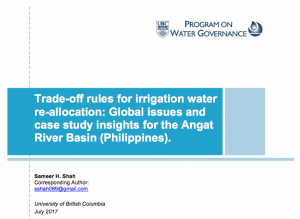
S. Shah (2017) Policy Brief: Trade-off rules for irrigation water re-allocation: Global issues and case study insights for the Angat River Basin (Philippines). The University of British Columbia.
Many countries, including India, China, and those in sub-Saharan Africa are re-allocating water away from irrigation and deprioritizing water’s use in farming (see cases by Wagle et al., 2012; Birkenholtz, 2016; Wang et al., 2015; Komakech et al., 2012). These are not isolated cases; large shares of irrigation water rights are being transferred, in some cases permanently, to domestic and industrial users around the world (Molle & Berkoff, 2006 provide an overview). Population growth, urban expansion, and industrial investment are all claims that support re-allocation (ibid). These claims are further justified when agriculture is blamed as inefficient and wasteful, and when countries emphasize, including through the use of the Human Right to Water, that re-allocations for drinking water is an essential and required shift (ibid, Goff & Crow, 2014). From this perspective, inter-basin water transfers are seen as a logical response whereas efforts to improve local capture, management, and inefficient distribution for non- agricultural water users is often given less attention (Molle & Berkoff, 2006). This Policy Brief summarizes research undertaken in the Philippines as one illustrative example of such shifts. It acknowledges that because irrigators have existing water rights does not mean that these should be permanently fixed against a backdrop of climatic, population, and demand changes. Instead, it is important to reconsider and assess allocation trade-offs in light of shifting biophysical realities and changing socio-ecological priorities. With this recognition, the Brief argues that transparent and accountable processes must safeguard users from the costs and trade-offs associated with changes in how water is allocated. In particular, trade-off rules, notably around reparations, can ease the inevitable and sometimes-enormous risk placed on agriculturalists when re-allocation occurs.
Read more here.